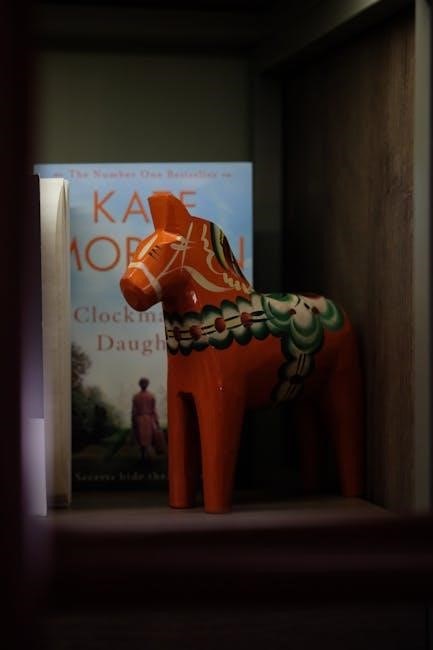Daphne du Maurier’s Rebecca is a timeless gothic novel exploring themes of love‚ obsession‚ and identity․ Published in 1938‚ it remains a beloved classic in English literature․
1․1․ Brief Overview of the Novel
Rebecca‚ written by Daphne du Maurier‚ is a gothic romance novel that follows an unnamed protagonist‚ a young and insecure woman‚ as she navigates her marriage to Maxim de Winter‚ a wealthy widower․ The story unfolds against the backdrop of Manderley‚ Maxim’s grand estate‚ where the memory of his late wife‚ Rebecca‚ looms large․ The novel explores themes of love‚ obsession‚ and identity‚ as the protagonist struggles to find her place in a world dominated by Rebecca’s lingering presence․ With its atmospheric settings‚ suspenseful plot‚ and complex characters‚ Rebecca delves into the darker aspects of human nature and the haunting power of the past․ Its intricate narrative keeps readers engrossed in a tale of mystery and emotional depth․
1․2․ Importance of the Book in Literary History
Rebecca holds a significant place in literary history as a seminal work of 20th-century gothic fiction․ Daphne du Maurier’s masterful blend of romance‚ mystery‚ and psychological depth influenced numerous authors and genres․ The novel’s exploration of complex female characters and its atmospheric settings set a new standard for gothic narratives‚ inspiring works like The Forgotten Garden and Olive Kitteridge․ Its enduring popularity has solidified its status as a classic‚ with themes of love‚ obsession‚ and identity continuing to resonate with readers․ Rebecca remains a cornerstone of English literature‚ celebrated for its timeless appeal and universal themes‚ ensuring its relevance across generations and literary movements․

Plot Summary of “Rebecca”
A young‚ unnamed protagonist marries the wealthy Maxim de Winter and moves to Manderley‚ his grand estate․ She struggles under the haunting memory of Rebecca‚ Maxim’s late wife‚ whose presence lingers through the sinister housekeeper‚ Mrs․ Danvers․ As secrets unravel‚ the protagonist discovers Rebecca’s true nature and the tragic events surrounding her death‚ leading to a shocking revelation that changes everything․ The novel culminates in the destruction of Manderley‚ symbolizing the end of an era and the beginning of a new life for the protagonist․
2․1․ The Unnamed Protagonist’s Journey
The unnamed protagonist of Rebecca embarks on a journey of self-discovery and marital adjustment․ A shy‚ young woman‚ she marries Maxim de Winter‚ a widower‚ and moves to Manderley‚ his sprawling estate․ Initially overwhelmed by the grandeur of her new life‚ she struggles with feelings of inadequacy‚ haunted by the memory of Rebecca‚ Maxim’s deceased wife․ Her insecurities are exacerbated by the sinister housekeeper‚ Mrs․ Danvers‚ who idolizes Rebecca․ As the protagonist uncovers secrets about Rebecca’s life and death‚ she begins to assert herself‚ challenging the shadows of the past․ Her journey is marked by growth‚ as she navigates love‚ loyalty‚ and identity‚ ultimately finding her place in Manderley and in Maxim’s heart․
2․2․ The Mysterious Rebecca and Her Legacy
Rebecca‚ the late wife of Maxim de Winter‚ is a central yet absent figure in the novel․ Her mysterious and tragic life casts a shadow over Manderley‚ the de Winter estate․ Known for her beauty and charisma‚ Rebecca is portrayed as a complex character with flaws and secrets․ Her bisexuality and rebellious nature are hinted at‚ adding depth to her enigmatic persona․ The housekeeper‚ Mrs․ Danvers‚ obsessively preserves Rebecca’s memory‚ creating an intimidating presence that haunts the new Mrs․ de Winter․ Rebecca’s legacy is one of intrigue and turmoil‚ influencing the lives of those around her even after her death․ Her story slowly unravels‚ revealing a life of both grandeur and dysfunction․
2․3․ The Role of Maxim de Winter and Manderley
Maxim de Winter‚ the enigmatic patriarch‚ is a man burdened by his past․ His marriage to the unnamed protagonist is overshadowed by the memory of Rebecca‚ his late wife․ Manderley‚ the grand estate‚ serves as both a character and a symbol in the novel․ It embodies the enduring legacy of the de Winter family and the haunting presence of Rebecca․ Maxim’s complex personality‚ marked by both charm and reserve‚ is central to the plot․ His relationship with the protagonist evolves slowly‚ revealing layers of his personality․ Manderley‚ with its imposing structure and intricate details‚ mirrors Maxim’s inner turmoil and the dark secrets he harbors․ Together‚ Maxim and Manderley form the emotional and physical heart of the story‚ shaping the protagonist’s journey and the unfolding drama․

Themes in “Rebecca”
Daphne du Maurier’s Rebecca masterfully explores themes of love vs․ obsession‚ identity struggles‚ and the haunting power of the past‚ creating a timeless psychological tapestry․
3․1․ Love vs․ Obsession
The novel delves into the fine line between love and obsession‚ particularly through Maxim’s complex feelings for Rebecca and his second wife․ While love is selfless and nurturing‚ obsession is possessive and destructive․ Rebecca embodies the destructive power of obsession‚ as her manipulative nature and refusal to let go of Maxim even in death illustrate․ In contrast‚ the second Mrs․ de Winter represents a quieter‚ more genuine form of love‚ which ultimately triumphs over the toxic legacy of Rebecca․ This theme is central to the novel’s exploration of human emotions and relationships‚ making it a profound study of the heart’s darker corners․
3․2․ Identity and Self-Discovery
The theme of identity and self-discovery is central to Rebecca‚ particularly through the unnamed protagonist’s journey․ Her marriage to Maxim de Winter thrusts her into a world of luxury and mystery‚ where she must navigate the shadow of Rebecca’s presence․ The protagonist’s struggle to define herself‚ separate from Rebecca’s influence‚ highlights the challenges of self-discovery in the face of societal expectations and personal insecurities․ Through her experiences at Manderley‚ she learns to assert her own identity‚ embracing her strengths and vulnerabilities․ This journey mirrors universal struggles of self-discovery‚ making the novel deeply relatable․ The protagonist’s evolution from naivety to maturity underscores the transformative power of love‚ loss‚ and resilience․
3․3․ The Haunting Past and Its Impact
The haunting past in Rebecca profoundly shapes the lives of its characters‚ particularly the unnamed protagonist and Maxim de Winter; Rebecca’s memory lingers obsessively‚ casting a dark shadow over Manderley and its inhabitants․ The protagonist grapples with the legacy of her predecessor‚ whose presence is felt through the meticulous preservation of Manderley and the sinister influence of Mrs․ Danvers․ Maxim‚ too‚ is burdened by his past with Rebecca‚ whose death and secrets continue to haunt him․ The novel explores how unresolved histories can dominate the present‚ influencing relationships and identities․ This theme underscores the gothic elements of the story‚ where the past refuses to remain buried‚ affecting both individual psyches and the atmosphere of the estate․ The haunting past thus becomes a central force driving the plot and character development․

Characters in “Rebecca”
The novel features a complex cast‚ including the naive protagonist‚ the brooding Maxim de Winter‚ the enigmatic Rebecca‚ and the sinister Mrs․ Danvers‚ each shaping the story’s dark intrigue․
4․1․ The Second Mrs․ de Winter: A Study in Insecurity
The unnamed protagonist‚ the second Mrs․ de Winter‚ embodies insecurity and vulnerability․ Her youth and naivety make her susceptible to feelings of inadequacy‚ particularly when compared to Rebecca․ She struggles with self-doubt‚ unsure of her place in Manderley and in Maxim’s life․ Her insecurities are heightened by Rebecca’s lingering presence‚ which she feels she cannot match․ Throughout the novel‚ she grapples with her identity‚ torn between societal expectations and her own desires․ Her journey is one of gradual self-discovery‚ as she learns to navigate her role and confront the shadows of the past․ Her character highlights the universal human struggle with insecurity and the quest for self-acceptance․

4․2․ Rebecca: The Enigmatic and Flawed Antagonist
Rebecca‚ the deceased first wife of Maxim de Winter‚ is a complex and enigmatic figure whose presence haunts the novel․ Though she never appears directly‚ her influence permeates Manderley and the lives of its inhabitants․ Rebecca is portrayed as a flawed yet captivating character‚ whose bisexuality and rebellious nature challenge societal norms․ Her legacy is one of both admiration and fear‚ as she embodies a freedom and confidence that the second Mrs․ de Winter envies yet finds intimidating․ Rebecca’s flaws‚ such as her cruel treatment of others and her troubled relationship with her father‚ add depth to her character‚ making her a multi-dimensional antagonist․ Her mysterious and tragic end only amplifies her enigmatic persona‚ leaving readers to ponder her true nature and motivations․
4․3․ Mrs․ Danvers: The Sinister Housekeeper
Mrs․ Danvers‚ the housekeeper of Manderley‚ is a formidable and sinister figure who embodies the oppressive atmosphere of the estate․ Her unwavering loyalty to the late Rebecca de Winter is both fascinating and unsettling․ Mrs․ Danvers’ interactions with the second Mrs․ de Winter are laced with passive aggression and psychological manipulation‚ as she constantly reminds her of Rebecca’s superiority․ Her presence evokes fear and discomfort‚ making her one of the most memorable antagonists in the novel․ Mrs․ Danvers’ character serves as a symbol of the haunting past and the enduring legacy of Rebecca‚ whose influence she fiercely protects․ Her actions and demeanor contribute significantly to the tension and suspense‚ making her a pivotal element in the story’s gothic undertones․
Symbolism in the Novel
In Rebecca‚ Manderley symbolizes the past’s oppressive grip‚ while the sea represents Rebecca’s restless spirit and tragic fate‚ reflecting themes of love‚ obsession‚ and identity․
5․1․ The Significance of Manderley
Manderley‚ the grand estate in Rebecca‚ serves as a central symbol‚ embodying the weight of the past and the oppressive legacy of Rebecca’s presence․ Its grandeur reflects the societal expectations and traditions that trap the unnamed protagonist‚ while its slow decline mirrors Rebecca’s fading influence․ Manderley becomes a character itself‚ with its labyrinthine rooms and hidden secrets symbolizing the psychological turmoil of its inhabitants․ The house represents both beauty and decay‚ highlighting the tension between nostalgia and the impossibility of escaping history․ Through Manderley‚ du Maurier explores themes of identity‚ power‚ and the haunting past‚ making it a poignant backdrop for the unfolding drama․
5․2․ The Symbolism of the Sea
The sea in Rebecca symbolizes freedom‚ mystery‚ and the untamed spirit of the late Rebecca de Winter․ Its presence permeates the novel‚ reflecting Rebecca’s rebellious nature and her tragic demise․ The sea also serves as a metaphor for the unknown‚ mirroring the protagonist’s journey into uncharted emotional territory․ Its power and unpredictability underscore the themes of obsession and the inescapable past‚ as Rebecca’s body is discovered in a sunken boat‚ tying her fate to the sea’s depths․ The sea’s imagery adds to the novel’s gothic atmosphere‚ symbolizing both beauty and danger‚ and highlighting the enduring legacy of Rebecca‚ whose influence lingers like the ocean’s waves over Manderley․
Gothic Elements in “Rebecca”
Rebecca masterfully employs gothic elements‚ including suspenseful atmospheres‚ mysterious settings like Manderley‚ and eerie characters such as Mrs․ Danvers‚ creating a haunting and immersive experience․
6․1․ Atmospheric Settings and Suspense
Daphne du Maurier crafts a foreboding atmosphere in Rebecca through settings like Manderley‚ with its grandeur and shadows‚ evoking suspense․ The isolated estate‚ shrouded in mystery‚ reflects the protagonist’s unease․ The sea‚ another key element‚ symbolizes the unknown‚ heightening tension․ Suspense builds through descriptive details‚ such as the overgrown garden and the lingering presence of Rebecca‚ creating a sense of dread․ These elements immerse readers in a gothic world‚ emphasizing the psychological turmoil of the characters and the haunting legacy of the past․
6․2․ The Supernatural and the Unknown
In Rebecca‚ Daphne du Maurier subtly incorporates elements of the supernatural‚ enhancing the novel’s gothic essence․ The lingering presence of Rebecca‚ though not physically manifest‚ haunts Manderley‚ creating an eerie atmosphere․ The housekeeper‚ Mrs․ Danvers‚ perpetuates this sense of unease‚ her actions bordering on the unnatural․ The mysterious death of Rebecca and the subsequent revelations add layers of suspense‚ keeping readers engaged․ While the novel avoids overt supernatural events‚ the psychological impact of the unknown drives the narrative‚ leaving a lasting impression on the reader․
The Author: Daphne du Maurier
Daphne du Maurier (1907–1989)‚ a celebrated British author‚ wrote gothic novels like Rebecca and Jamaica Inn‚ combining romance‚ mystery‚ and psychological depth‚ leaving a lasting legacy․
7․1․ Biography of Daphne du Maurier
Daphne du Maurier (1907–1989) was a renowned British author‚ playwright‚ and poet․ Born in London‚ she grew up in a creative family‚ with her father‚ Sir Gerald du Maurier‚ a celebrated actor․ Her early life was marked by a love for writing and the sea‚ which later inspired her works․ du Maurier gained fame with her 1938 novel Rebecca‚ a gothic romance that became a classic․ She wrote other notable works like Jamaica Inn and My Cousin Rachel․ Known for blending romance‚ mystery‚ and psychological depth‚ du Maurier’s novels often explored themes of identity and the supernatural․ Her legacy endures as a master of atmospheric storytelling․
7․2․ Her Inspiration for Writing “Rebecca”
Daphne du Maurier drew inspiration for Rebecca from her personal experiences‚ including her marriage to Frederick Browning and her deep connection to Cornwall․ The grand estate of Menabilly‚ which she later owned‚ influenced her portrayal of Manderley․ Her fascination with the complexities of human relationships and the lingering influence of the past also shaped the novel․ Du Maurier’s writing often reflected her love for atmospheric settings and psychological depth‚ which are central to Rebecca․ The novel’s exploration of jealousy‚ identity‚ and obsession was further fueled by her interest in the darker aspects of love and the power dynamics within relationships․ These elements combined to create a timeless tale that captivates readers with its haunting beauty and emotional complexity․

Cultural Impact of “Rebecca”
Rebecca is a 20th-century literary classic‚ influencing films‚ adaptations‚ and modern storytelling․ Its exploration of love‚ identity‚ and obsession continues to captivate readers and inspire new works globally․
8․1․ The Novel as a Classic of 20th-Century Literature
Rebecca stands as a seminal work in 20th-century literature‚ blending gothic elements with psychological depth․ Its influence is evident in modern novels and films‚ showcasing its enduring appeal․ The novel’s exploration of complex themes like love‚ obsession‚ and identity resonates deeply with readers․ Its gothic atmosphere and suspenseful plot have set a benchmark for the genre․ As a classic‚ it continues to be widely read and studied‚ solidifying its place in literary history․ The novel’s ability to transcend time and connect with diverse audiences underscores its lasting impact on literature and popular culture․
8․2․ Film Adaptations and Their Influence
The enduring popularity of Rebecca is evident in its numerous film adaptations․ The most iconic is Alfred Hitchcock’s 1940 version‚ starring Laurence Olivier and Joan Fontaine‚ which won the Academy Award for Best Picture․ This adaptation remains a classic‚ capturing the novel’s suspenseful atmosphere and complex characters․ In 2020‚ a new adaptation was released on Netflix‚ starring Lily James and Armie Hammer‚ introducing the story to a modern audience․ These films highlight the timeless appeal of du Maurier’s work‚ ensuring its influence extends beyond literature into cinema․ The adaptations not only honor the original novel but also adapt its themes for contemporary viewers‚ solidifying Rebecca’s place in both literary and cinematic history․

Why Read “Rebecca”?
Rebecca captivates readers with its timeless themes of love‚ obsession‚ and identity․ Its intricate characters and gothic atmosphere make it a beloved classic‚ ensuring its enduring cultural significance․
9․1․ Timeless Appeal of the Story
Daphne du Maurier’s Rebecca endures as a timeless tale due to its masterful blend of romance‚ suspense‚ and psychological depth․ The story’s exploration of love‚ obsession‚ and identity resonates universally‚ transcending generations․ Its gothic atmosphere‚ centered around the enigmatic Manderley‚ captivates readers with its eerie beauty and secrets․ The protagonist’s journey of self-discovery‚ set against a backdrop of mystery‚ creates a compelling narrative that remains relatable․ The novel’s ability to weave intricate characters‚ moral dilemmas‚ and emotional complexity ensures its lasting appeal․ Readers continue to find themselves drawn into the haunting world of Rebecca‚ making it a cherished classic in modern literature․
9․2․ Universal Themes and Relatability
Rebecca’s universal themes of love‚ identity‚ and the past’s influence resonate deeply with readers․ The protagonist’s struggle to find her place in a world overshadowed by Rebecca’s legacy mirrors common human experiences of insecurity and self-doubt․ The novel’s exploration of relationships‚ power dynamics‚ and societal expectations remains relevant today․ Its portrayal of flawed characters‚ particularly Rebecca and Maxim‚ invites readers to reflect on their own moral complexities․ The story’s emotional depth and relatable conflicts ensure its connection with audiences‚ making it a work that transcends time and cultural boundaries․ This relatability is a key factor in the novel’s enduring popularity and its status as a literary masterpiece․

Resources for Further Exploration
Explore the PDF version of Rebecca online‚ along with study guides and analyses․ Join online discussions and book clubs to delve deeper into its themes and characters․
10․1․ Where to Find the PDF Version of “Rebecca”
To access the PDF version of Rebecca‚ visit reputable online libraries like Project Gutenberg or ManyBooks․ These platforms offer free downloads of classic literature․ Additionally‚ eBook retailers such as Amazon and Google Books provide digital copies for purchase․ Ensure to download from authorized sources to avoid copyright infringement․ Local libraries often provide free access to eBooks through services like OverDrive․ For academic purposes‚ check university databases or purchase directly from the publisher’s official website․ Always verify the legality of the source to support authors and publishers․ This ensures you enjoy the novel while respecting intellectual property rights․
10․2․ Study Guides and Analysis
For deeper understanding‚ numerous study guides and analyses of Rebecca are available online․ The Rebecca Project offers enhanced computer texts with biographies‚ historical context‚ and critical analysis․ Platforms like SparkNotes and LitCharts provide detailed summaries‚ character analyses‚ and theme explorations․ Academic databases such as JSTOR and Google Scholar host scholarly articles and essays on the novel’s gothic elements and psychological depth․ Many university libraries provide access to these resources․ Additionally‚ online platforms like Scribd and Academia․edu often feature user-shared PDFs and essays․ These tools are invaluable for students and readers seeking to explore the novel’s complexities‚ such as its portrayal of obsession‚ identity‚ and the haunting past․
10․3․ Online Discussions and Book Clubs
Online discussions and book clubs offer vibrant spaces to engage with Rebecca․ Platforms like Goodreads host dedicated groups where readers share insights and analyses․ Reddit’s r/Books and r/Classics frequently feature threads on the novel․ Many virtual book clubs focus on gothic literature‚ making Rebecca a popular choice․ Sites like BookClubz and Meetup organize live chats‚ fostering deeper discussions․ Additionally‚ literary blogs and forums often invite readers to share their interpretations of the novel’s complex characters and themes․ These online communities provide a dynamic environment for readers to exchange perspectives and explore the lasting appeal of Rebecca․

